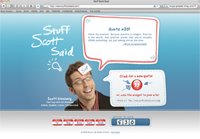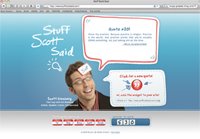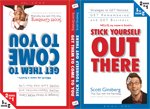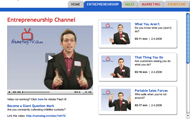 “Freeeeeeebirrrrrrrd!!!!!”
“Freeeeeeebirrrrrrrd!!!!!”
There’s always ONE guy in the audience who HAS to yell it.
Every time. Every concert. No matter where you go.
Ah, Freebird. Without a doubt, the most requested song in music history.
Interestingly, in 2005, WSJ ran an article that (finally) revealed the origin of this phenomenon:
“Freebird is hardly obscure – it’s a radio staple consistently voted one of rock’s greatest songs. One version of the tune – and an important piece of the explanation – anchors Skynyrd’s 1976 live album One More From the Road. On the record, singer Ronnie Van Zant, who was killed along with two other band mates in a 1977 plane crash, asks the crowd, ‘What song is it you want to hear?’ That unleashes a deafening call for Freebird, and Skynyrd obliges with a fourteen-minute rendition.”
SO HERE’S THE BIG QUESTION: How often are YOU requested? In the great concert of business, how often are customers holding up their Zippos and yelling out for YOU?
ANSWER: Not enough.
Today we’re going examine a collection of practices – each with its own “reqeustion” – on becoming a more requestable entity.
1. A forced brand is a forgotten brand. Requestability begins with branding. And by branding I don’t mean pumping some twenty-five cent shtick out of think air after three hours of brainstorming with your two teenage daughters.
Rather, truly taking the time to organically pinpoint (a) what you are, (b) how you roll and (c) what the purposeful identification of your unique value is. Then and ONLY then, your mission is to emblazon that brand on the minds of the customer. That’s what really matters: Not marketshare, but mindshare. Because customers can’t request what they don’t remember.
REQUESTION: When was the last time you updated your brand identity?
2. Be someone who offers a dependable perspective. Predictability is the great persuader. It’s also the true trust agent. And trust is the sole source of your level of influence. To enhance the predictability of your perspective, here is an exercise you might try. It revolves around the most important question I ask my clients (and myself):
If everybody did exactly what you said, what would the world look like?
I challenge you to ask, contemplate, clarify, write out and eventually print out your answers to this question. Look at them every day. Consider them as a framework. A governing document for daily decision-making. I guarantee your perspective will become more dependable.
REQUESTION: If everybody did exactly what you said, what would the world look like?
3. Everything you do should lead to something else you do. Cross-promotion is a surefire practice for becoming more requestable, as long is you do it right. Here’s how.
a. Be subtle. Be cool and be casual. And when you promote one of your other services, share as if you were just telling a story. The best marketers are the ones customers don’t realize are marketing.
b. Be specific. Requestability is a function of credibility, which is a function of specificity. When you cross-promote other products you offer, cite their full titles and descriptions. Whet the appetite of hungry customers.
c. Be significant. When you mention other work that you’ve done, remember the two magic words: For instance. “I work with a variety of non-profits on strategic planning. For instance, last week I hosted a two-day with the American Casket Association. I knocked ‘em dead!
Be very careful with cross-promotion. Too much of it turns customers off quickly. It’s only effective insofar as you don’t morph every conversation into a sneaky little sales presentation.
REQUESTION: What else does this person need to know about you?
4. Play to the heart, not the mind. Don’t make people think – make them FEEL. People don’t want to think – it too much work. People are tired of thinking. They think all day. Instead, position your value in a way that elicits emotion. Disturb customers into action.
Remember: Emotion is the final arbiter of the effectiveness of your message. Learn to make people feel, and the requests will come pouring in.
REQUESTION: What part of the customer’s body are you playing to?
5. Discount yourself as a threat. In the book How to Hide a Dagger Behind a Smile, author Kaihan Krippendor suggested, “Because someone seems non-threatening, others offer no resistance.” Your goal is to lower threat level by demonstrating a timeline of credibility. Here are a few ways to do so:
a. Media Room: Dedicate an entire page to chronicling every interaction you’ve had with the media – in print, online and on air. Include links to articles, videos or blog posts quoting and featuring you. (Good example aqui.)
b. Client List: Dedicate another page to listing past clients you’ve worked with over the years. Go back as far as you can. Demonstrate longevity and diversity of reach with cross-industrial references.
c. Testimonial Collection: Video is ideal. If not, written references are the next best. Just make sure to choose testimonials featuring clients who are a good advertisement for your business. And if possible, select testimonials that share common customer preoccupations – then how you overcame those concerns. For example, “When I first met Scott, I wasn’t sure if some thirty year-old writer could actually help a corporate executive like me make a name for himself. I was dead wrong. Scott’s ability to ask the right questions changed my life because…”
REQUESTION: How are you reducing the threat level from red to green?
6. Find out what’s missing for people. Help customers articulate what’s mysteriously absent from their strategy. For instance, when I work with coaching and consulting clients, I almost always suggest that they draw out their current issue. On paper, on a flip chart, on the dry erase, whatever.
And clients are constantly amazed what they learn when they capture their thoughts visually. Ultimately: Thinking on paper produces clarity. The cool part is, the power of comparative analysis overrides (most of) the lies people telling themselves.
REQUESTION: How are you helping people define the white space around their ideas?
7. Project peaceful confidence. Would you request someone who ceaselessly asked for a request every time you crossed paths? Of course not. Customers rarely request people whose stench of neediness requires nose plugs. As I learned from the great Lao-Tzu:
“When you show your strength, you appear weak. When you conceal your power, the more effectively it can be used. When you make your advantage less obvious, the more effective you power becomes.”
Remember: The truest part of you doesn’t need to speak. Customers will hear it either way, and if the music speaks to them, they will request more of it.
REQUESTION: What drenches you in confidence?
8. Maintain prime presence. Finally, requestability is a function of visibility. Which becomes especially challenging when EVERYONE is vying for the same spot on your customer’s set list. The secret is twofold. First, visibility is the price of admission. The ante. The baseline.
And it’s only the first step to achieving prime presence. Second, it’s how you show up. It’s not just that you’re visible, but how you customers experience you – PLUS how they experience themselves in relation to you – when you DO show up. In short: Bring unique value or consider yourself winking in the dark. Remember: Anonymity is bankruptcy.
REQUESTION: Do you have a marketing plan or a visibility plan?
REMEMBER: In the great concert of business, your mission is rock with value SO hard that customers start yelling out requests for YOU.
Consider these requestions. Execute these practices. And your firm’s services will become more requestable.
“Freeeeeeebirrrrrrrd!!!!!”
LET ME ASK YA THIS…
Who’s requesting you?
LET ME SUGGEST THIS…
For the list called, “6 Ways to Out Position the Competition,” send an email to me, and you win the list for free!
* * * *
Scott Ginsberg
That Guy with the Nametag
Author, Speaker, Coach, Entrepreneur
[email protected]
 Who’s quoting YOU?
Who’s quoting YOU?
Check out Scott’s Online Quotation Database for a bite-sized education on branding success!

 1. Abundance of competition indicates unoriginality. If you’re truly unique, the only one who does what you do – the WAY that you do it – then no second-rate, chump-ass imitation should be able to hurt you. Screw the competition. Just because they’re there doesn’t mean you can’t beat them. What do you do that brings people back for more of YOU?
1. Abundance of competition indicates unoriginality. If you’re truly unique, the only one who does what you do – the WAY that you do it – then no second-rate, chump-ass imitation should be able to hurt you. Screw the competition. Just because they’re there doesn’t mean you can’t beat them. What do you do that brings people back for more of YOU? Who’s quoting YOU?
Who’s quoting YOU? 1. Abandonment is the backbone of entrepreneurship. By definition, an entrepreneur is someone who undertakes and manages risk. Someone vulnerable. Someone courageous enough to stick herself out there.
1. Abandonment is the backbone of entrepreneurship. By definition, an entrepreneur is someone who undertakes and manages risk. Someone vulnerable. Someone courageous enough to stick herself out there.  Who’s quoting YOU?
Who’s quoting YOU? 1. What are you doing to become even more visible?
1. What are you doing to become even more visible? The world’s FIRST two-in-one, flip-flop book!
The world’s FIRST two-in-one, flip-flop book! • Action. That means more doing and less talking. How many times did you blog last week?
• Action. That means more doing and less talking. How many times did you blog last week?
 What’s THEE best adjective to come after your name?
What’s THEE best adjective to come after your name?
 The Sanskrit word namaste translates to, “The sprit within me honors the spirit within you.”
The Sanskrit word namaste translates to, “The sprit within me honors the spirit within you.” Emerson once suggested, “Make yourself necessary to the world, and mankind will give you bread.”
Emerson once suggested, “Make yourself necessary to the world, and mankind will give you bread.”